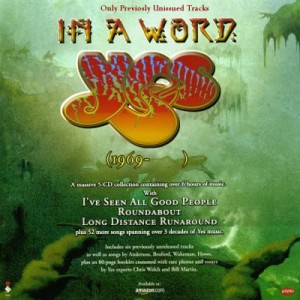Yes – In A Word
When I first got the opportunity to write about rock for a San Diego underground paper, I couldn’t help it. I wanted to write about the music that mattered to me. I wanted to write about Yes.
An interview was arranged while the band was in town for a concert. I was told to go to the backstage door of the San Diego Sports Arena and ask for tour manager Alec Scott. I did so. The list was not there. I still remember the guard. He looked like a battered nightclub comic. He wore a yellow checkered jacket. And he hated me.
Ultimately, the message did get to Scott, who pulled me into the band’s dressing room for an interview with the celebrated keyboardsman Rick Wakeman. The interview ended when the band exited for the stage. After the concert, Scott slipped me backstage again. Changing into street clothes, still adrenalized from the show, the rest of the band now weighed in. Jon Anderson, Bill Bruford, Chris Squire, and Steve Howe all took passionate turns explaining their quest to be around a long time, playing music their way. All for a local underground giveaway paper.
Later given a chance to freelance some pieces for Rolling Stone, I chose Yes. We toured Southern California together. It was the first time I’d truly seen how a band operated, the delicate chemistry of a group. There was an utter seriousness about their quest to be truly great, always combined with a humor that flashed just below the surface.
Years later, putting together Almost Famous, I dug out all those interviews and my own time-honored collection of their vinyl. I wrote a scene almost exactly replicating that first night backstage with Yes. And when we added music to the movie, it was Yes’ “I’ve Seen All Good People (Your Move)” that gave my editor and I our first real shiver of joy at what the movie could be. It was only fitting. Their music still matters, year in and year out. Whatever trend was in vogue, you could always still find Yes on any radio dial.
Here’s one more fond memory. Writing about Pearl Jam in the heyday of the so-called grunge explosion, guitarist Stone Gossard was sitting in the back of a car moving through San Francisco. “There’s so much for this band to accomplish,” he said, leaning forward, “but what I really want is for us to make our Tales From Topographic Oceans.”
Wherever you go, wherever you find a record collection of essentials, go to the end and work back just a little bit. You’ll find them there. Years later, they’re still together, no longer just a band, but the owners of a genre all their own. Yesmusic.
Cameron Crowe grew up on tour, as a 15-year-old Rolling Stone contributor and confidante of Lester Bangs. He later turned to moviemaking, penning the novel and script that became the teen classic Fast Times At Ridgemont High (1982). Crowe has since become one of Hollywood’s most prolific screenwriter-directors, whose highlights include Say Anything (1989), Singles (1992), Jerry Maguire (1996), and the autobiographical Almost Famous (2000), which was awarded an Oscar® for Best Original Screenplay. His latest film is Vanilla Sky (2001).
Yes: In a Word: Introduction – Cameron Crowe – © 2002 Vinyl Films


